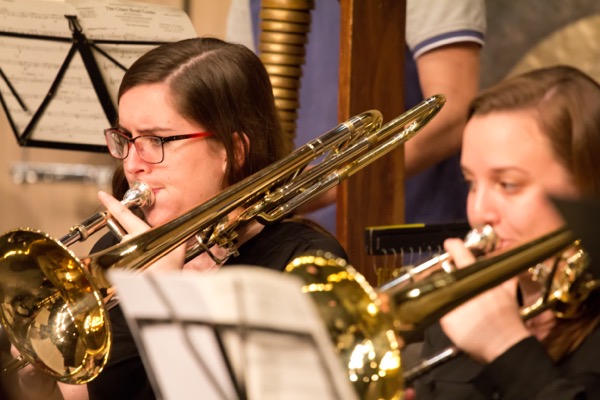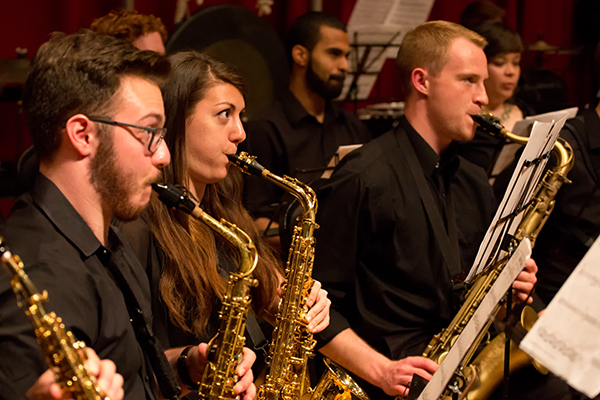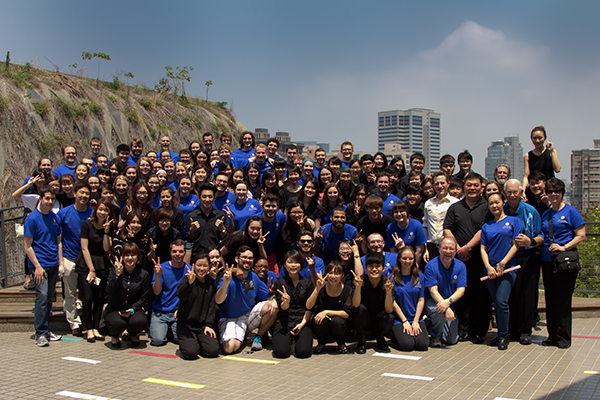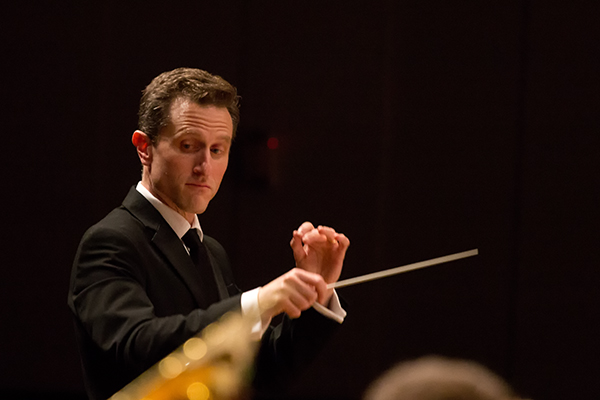

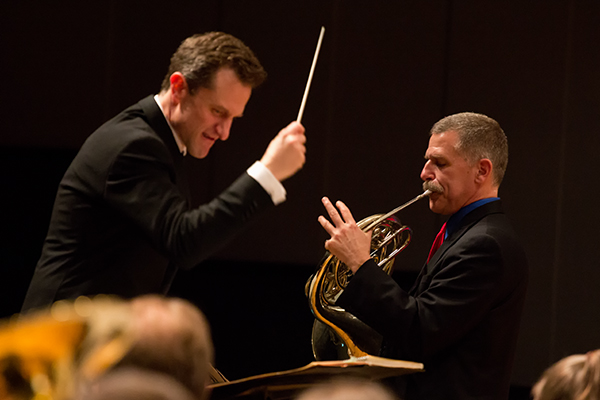
Taiwan performances
UD Wind Ensemble members reflect on 'journey of a lifetime'
1:15 p.m., May 20, 2015--Last month, the University of Delaware Wind Ensemble completed a set of performances that took almost two years of planning at the 2015 Taiwan Clinic, an international band and orchestra conference in Taipei, Taiwan.
The ensemble, composed of 51 students under the direction of Chad Nicholson, associate professor of music, became the first-ever American ensemble to perform at the Taiwan Clinic.
Global Stories
Fulbright awards
Peace Corps plans
In addition to being guests at the conference, the UD students and faculty spent a week in Taipei performing at local schools, exploring and engaging in Taiwanese culture and interacting with students of the Tunghai University Symphonic Band.
The announcement
Nicholson had wanted his students to experience the excitement of performing overseas for global audiences, saying it was also a great way for them to interact with other cultures. He began actively exploring possible opportunities in late 2013, often reaching out to friends and colleagues for suggestions.
“The Taiwan Clinic was actually the first application that I had submitted for the ensemble,” said Nicholson. “I already knew about the Taiwan Clinic, and also that they never had an American band perform there, so I figured we might as well apply and see what happens.”
Soon after submitting performance recordings and applications, Nicholson heard back from the clinic, confirming that the UD Wind Ensemble had been selected as guest performers at the 2015 conference.
Michael D’Avino, who serves as the ensemble’s graduate assistant conductor, said he wasn’t entirely surprised by the selection. D’Avino, a second-year graduate student who studies wind conducting under Nicholson’s instruction, assisted him in exploring overseas opportunities and preparing the applications.
“Having heard how well this ensemble sounds in both performances and rehearsals, and seeing how much time and effort these students put in to make beautiful music, I was honestly really confident in our chances of being accepted by the conference,” D’Avino said.
Russell Murray, interim chair of the Department of Music, worked with Nicholson to explore funding options that could help ease the financial burden of the trip for students in the ensemble.
“The students did have to pay for some of the trip costs, but we were able to help reduce the weight thanks to the support and generosity of the department, the College [of Arts and Sciences] and the Institute for Global Studies, for which we were all very grateful,” he said.
Once Nicholson and Murray confirmed that the trip and performances would be supported, all that was left was to announce it to the students. Following a performance at a Maryland music conference last spring, Nicholson surprised the students and the audience with the first public announcement about the trip.
Student reactions and auditions
“I’m pretty sure that most of us in the ensemble were just speechless, and we just had so many questions for Dr. Nicholson,” said Emily Smith, a junior music education major who plays trombone in the ensemble, recalling Nicholson’s impromptu public announcement. “After the initial surprise, I think that I just switched to being so excited for this incredible opportunity.”
The ensemble traditionally holds auditions at the start of each semester, but in the middle of the fall semester, a special set of auditions was held to determine who would be selected as a member of the ensemble that would travel to Taiwan. The Taiwan auditions were described as highly intense and competitive but still friendly and well-intentioned.
“Everyone wanted to be a part of the ensemble and be a part of the Taiwan experience,” said Smith, “but no one was rooting against the other students auditioning. Everyone was very encouraging of each other, and we even helped each other with the audition materials.”
When the audition results were posted, Smith was relieved to see her name on the roster. “I always walk out of an audition feeling like I could have played a certain section better,” she said, “but after finding out I made it, I just fell back into a feeling of excitement.”
Michael Swiren, a first-year graduate student who studies wind conducting under Nicholson, had a different perspective. Swiren graduated from UD last May with a bachelor’s degree in music education and during his undergraduate career, he played tuba under Nicholson’s direction in the ensemble.
“I remember feeling slightly disappointed” at the initial announcement, he said. “I would have loved the opportunity to perform overseas, but it only encouraged me and made me focus on my coming audition.”
Swiren’s audition late last spring was for the graduate program in wind conducting offered by the music department. After being accepted into the program, he learned that he would accompany the ensemble to Taiwan to help facilitate its travel and performances.
“My excitement came right back, and I couldn’t wait for this journey,” he said.
Impressions of Taiwan
Before arriving in Taiwan, Nicholson could already tell the importance of band culture in the country.
“Taiwanese culture is just so appreciative of making music, and appreciative of wind band culture,” he said. “They view the performance of music with such value, and it’s a reminder that music is a language that can cross borders, a lesson that I always try to instill in my students.”
The day after arriving in Taiwan, Nicholson was awakened at 6 a.m. by the sound of a band performing in the streets. “From my window, I couldn’t see where this group was, but I just took it as a sign of what we had to look forward to, and I couldn’t wait to see the students’ reactions to being in this new place,” he said.
During their time exploring Taipei, the students interacted with locals, sampled various elements of Taiwanese cuisine and street food and saw some of the city’s best-known attractions, including the towering skyscraper known as Taipei 101.
Murray observed that although Taipei is “not a popular destination for Western tourism,” there are many Western influences in the city. One in particular is a replica of Robert Indiana’s famous Love sculptures, which are also found in major American cities such as New York and Philadelphia.
D’Avino said he now knows what it feels like to be in “full-on tourist mode,” having gone through the experience of visiting a foreign country with no grasp of the local language, similar to what he has observed of some foreign tourists who visit the United States. He and several other students, however, did find a way to connect with local residents.
“We would get asked by shopkeepers and vendors about why we’re visiting Taiwan, and once we said that we were musicians, they really took to us,” he said. “It was incredible to see this same excitement and enthusiasm for wind band that many of us have. It had a way of helping us around the language barrier.”
Interacting with international peers
Aside from the performances at the Taiwan Clinic, UD Wind Ensemble members agreed that the biggest highlight of the voyage was meeting and engaging with students from the Tunghai University Symphonic Band. The groups mingled, as similar instrumental sections met with each other and talked excitedly about their musical experiences.
Smith said she felt welcomed by these new friends, as if the two groups had “known each other for years” and were just reuniting after a period of time.
“No matter where you go, or what culture you’re in, we’re all band people,” Swiren said. “A tuba player is a tuba player, a trumpet player is a trumpet player, and so on. There’s that special connection that brings us together.”
Nicholson, on meeting his counterpart from Tunghai University, felt the same way. “We’re both band directors, and ultimately, we have to same goals to create beautiful music and artistry,” he said.
Performances at the Taiwan Clinic
When it came time for the performances at the Taiwan Clinic, especially the finale concert, the ensemble personnel said they took to the stage with the same passion and confidence they perform with back home. They described the audience ovations after each piece of their repertoire, saying the reactions became louder and grander each time.
“The ensemble just kept raising the bar at each performance, and with each song,” said Murray, “and the audience seemed to do the same thing.”
Smith, on stage with the other students, couldn’t help but feel pride with each round of applause. “Each new ovation felt more rewarding than the last one,” she said, “and I feel like being able to tell my future music students about this experience is going to be even more rewarding than the biggest applause we received.”
In Taiwan, Nicholson said, encore pieces are expected to be performed after an ensemble completes a set. To prepare them for this additional challenge, the UD Wind Ensemble learned four additional selections for encores.
“We finished our set, and we played through each of our encores at the finale concert, but they still wanted more,” Nicholson said. “I had never seen such an extreme demand for more music before, but it was amazing to be able to say that we left them wanting more.”
Takeaways from the experience
Members of the ensemble brought back a similar message: Music is a key component in every culture.
“No matter where in the world you are, music is transcendent, able to cross any boundary and language barrier and bring people together,” said Smith.
Swiren, who knows how hard it might be for his future students to experience different cultures around the world, already has a lesson plan in mind. “The most important takeaway is that a B-flat played in Taiwan is the same B-flat that students play in the United States. Without even realizing it, our cultures are connected through that notion,” he said.
As for Nicholson and Murray, they agreed that everyone loves the classic Sousa march “The Stars and Stripes Forever,” which the ensemble played as one of their many encores.
“Their reactions to the tune were beyond enthusiastic,” Murray said of the audiences in Taiwan. “And they clapped along in the same way that many American audiences do.”
It was further proof, he said, of music’s ability to connect cultures all around the world.
Article by Craig Stack
Photos courtesy of the UD Wind Ensemble




